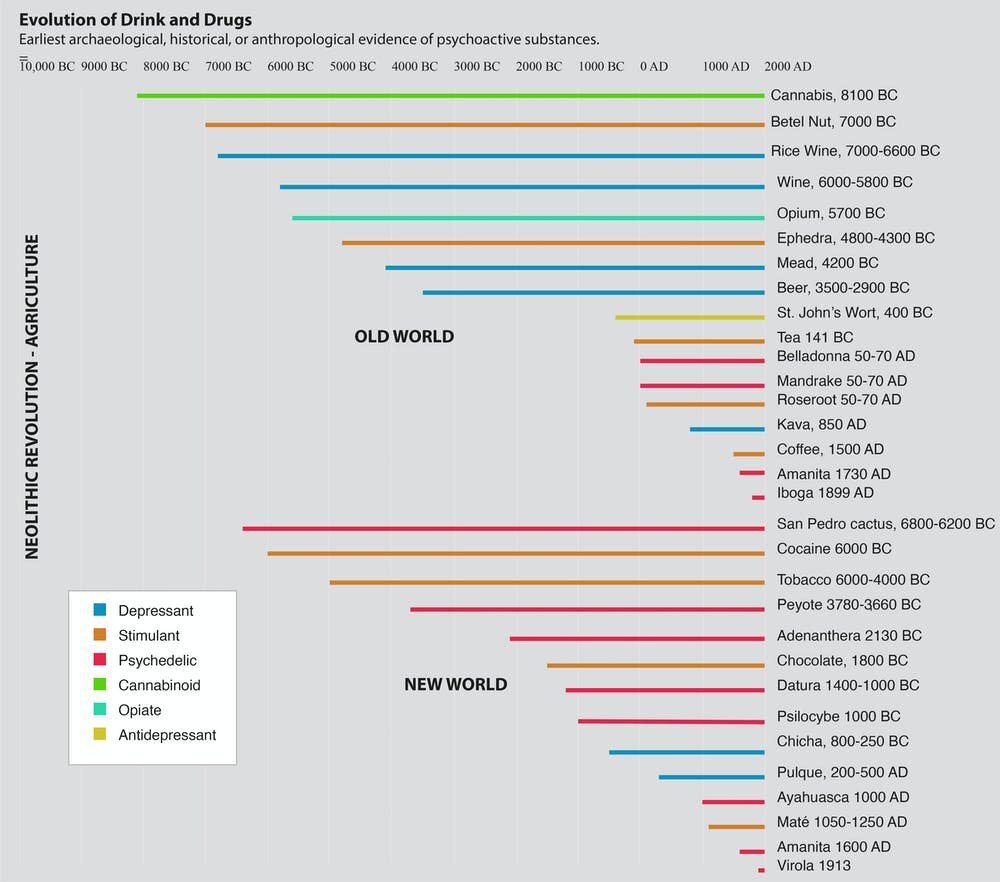The Evolution of Debauchery
 It’s one of my Top Ten Sentences of 2021 so far:
It’s one of my Top Ten Sentences of 2021 so far:
“A huge step in the evolution of debauchery was the invention of agriculture because farming made booze possible.”
I’ve never thought too deeply about the “evolution of debauchery” in general, but rather just my own. The story of my own debauched evolution is far less interesting than this little article at Phys.org, from which this awesome sentence originates: “When Did Humans Start Experimenting with Alcohol and Drugs?”
While it appears that the first evidence of a type of fermented wine for consumption dates back to about 9,000 years ago in China where rice was the vehicle for a debauchery-inducing liquid substance, the article notes that the West was particularly devoted to the substance:
“Eurasian and African civilizations seem to have preferred alcohol. Wine was central to ancient Greek and Roman cultures, was served at Plato’s Symposium and at the Last Supper, and remains incorporated in the Jewish Seder and Christian communion rituals.”
The article ends with a question we often see posited concerning the development of fermentation and the imbibing of alcohol: Why or how did civilization lead to a dedication to alcohol? Any number of explanations are suggested in response to this question. But the one I like the most is this (it ranks in my top 25 sentences of the year): “It may just be safer to get drunk or high in a city than the savannah.”
What I wonder is not so much when humans first started drinking wine, but when humans first started critiquing different wines. It has been suggested by many that the first serious wine writer was Pliny the Elder, who died at the hands of Mount Vesuvius in AD23. However, surely the first wine critics were those folks who had access to more than one wine. Who can tell exactly when this was.
It’s worth noting that despite our sophistication today where wine is concerned, despite our interest in different wines from myriad terroirs, in the end, it is the invitation to debauchery that makes wine special enough that we continue to drink it (and think about it) today. The key to wine being wine and appreciated for what it is boils down still to the fact that it is a vehicle for mind-altering alcohol. I’m reminded of this more today than at any time previous. As I age it is absolutely clear to me that my body metabolizes alcohol differently than it did with I was younger. Today, the effects of alcohol come on much more quickly and with fewer drinks than they did in my youth or even a decade ago. However, this is not to say I am more debauched today than I was in my 20s or 30s or 40s.

What I find fascinating is the moment in almost every society when alcohol slips out of the control of the religious elite into the public.
Tom–
You are too conscientious to be debauched,
Judy,
My guess is that the attempts to wrest control of alcohol from the religious elite happens pretty darned immediately.
Jim,
I think we need to reckon with the fact that debauchery is relative.
Tom…
Super good book out worth reading on this subject. Drunk: How We Sipped, Danced, And Stumbled Our Way to Civilization (by Edward Slingerland). It present a highly compelling argument that alcohol and other mind altering substances allowed civilization to occur and thrive…rather, than they becoming a feature or byproduct of civilization.
Or, perhaps, fermentation led to agriculture, pottery, and cities?
Many agricultural were semi nomadic, but jugs of booze keep you close.
I have not read Drunk: How We Sipped, Danced, And Stumbled Our Way to Civilization but now it is on my bucket list. There is a school of thought that the emergence into conscientiousness, especially creative conscientiousness went hand and hand with the emergence of mind-altering substances. Cave artwork is thought to have emerged with alcohol or other mind-altering substances. So, one may say our emergence into higher conscientiousness was with one hand on the bottle.
It is the dream state you slip into as you become inebriated that spurs creativity. Strangely, enough in our modern society if we want to insult someone, we call them a “dreamer”. Tea and coffee are stimulants that alter our conscientiousness however, these are stimulants that are good for commerce and profit so embraced. Ah, capitalism for all my Marxist friends.
Anyways, our creative conscientiousness may have been triggered in our ancestor’s exploration with alcohol. That is not to say that alcohol is all good with no downside. If alcohol begins to affect other aspects of your life and inhibit creativity and make you less productive then it is a sign of overuse and abuse of the substance. However, the kind view is that our creative impulse may have never immerged without alcohol in our belly is something worth contemplating over a brandy…. ha, ha.
I am not a full-on libertarian on drug legalization. I do think drugs and alcohol have serious downsides for societies and individuals/ families. They are not a panacea for the next Mozart 5th concerto you are hoping to write. But I do think the anti-alcohol movement is flawed because it only sees the negatives and leaves no room for the positives. How many great writers abused (bad) but abused the bottle? Hemingway comes to mind. And countless others.